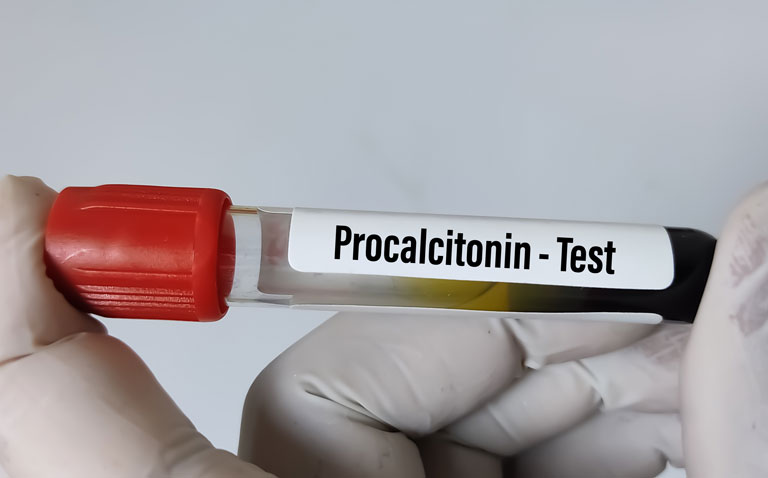Measurement of procalcitonin levels was found to be most discriminatory for severe disease course among patients hospitalised with COVID-19.
Knowledge about COVID-19 has advanced at rapid pace over the last 15 months and with a large number of patients being admitted to hospital, it is of upmost importance to be able to assess which patients are at the highest risk of disease progression. Based on earlier observational studies, it has become clear that older patients and those with co-morbidities are more likely to develop severe disease and several biomarkers including C-reactive protein and procalcitonin, have been shown to be associated with severe disease. A further potential complication of COVID-19 is bacterial co-infection though in an analysis of 24 studies including 3338 patients, the presence of bacterial co-infection in COVID-19 was found to be very low at 6.9%. Nevertheless, whether the use of biomarkers such as procalcitonin could be used to identify bacterial co-infection among patients with COVID-19 has been suggested as a potentially valid strategy, but there is a lack of evidence to support this approach.
This absence of evidence prompted a team from the Department of Internal Medicine, Haga Teaching Hospital, Den Haag, The Netherlands, to retrospectively evaluate the association between multiple biomarkers, including procalcitonin and the clinical and microbiological outcomes in patients hospitalised with COVID-19. The team used data from the PredictED study, a single centre, prospective observational study, designed to evaluate procalcitonin as a marker for bacteraemia in patients who present to the emergency department. While the original study was designed to examine all patients admitted to the emergency department, the authors turned to a subset of patients with PCR-confirmed COVID-19. A number of tests were undertaken, including blood cultures, C-reactive protein and procalcitonin although the results of this latter test were not immediately available to the treating clinician. The primary outcome of the study was the incidence of bacterial co-infection at the initial emergency department presentation and its association with procalcitonin.
Findings
The subset of COVID-19 patients testing positive for the virus was 142 with a mean age of 61 years (66% male). More than half of these patients had co-morbidities including diabetes (25%) and cardiovascular disease (24%) and from the complete cohort, 41 developed severe COVID-19, all of whom were hospitalised and 24 (17%) subsequently died within 30 days. Procalcitonin levels were significantly associated with the development of severe disease (odds ratio, OR = 1.8, 95% CL 1.3 – 2.2), as were higher levels of the biomarker. In addition, C reactive protein levels were also significantly associated with more severe disease (OR = 1.8, 95% CI 1.3–2.6). Using the area under the receiver operating curve for procalcitonin, the predictive value was 0.76.
Commenting on their results, the authors noted that procalcitonin demonstrated the highest discriminatory power between severe and non-severe COVID-19. Although only a small number of COVID-19 patients (1.4%) had a bacterial co-infection, the authors concluded that measurement of procalcitonin levels appeared to be a promising approach to help clinicians recognise patients a higher risk of more severe COVID-19 infection.
Citation
Kaal A et al. Diagnostic yield of bacteriological tests and predictors of severe outcome in adult patients with COVID-19 presenting to the emergency department. Emerg Med J 2021










